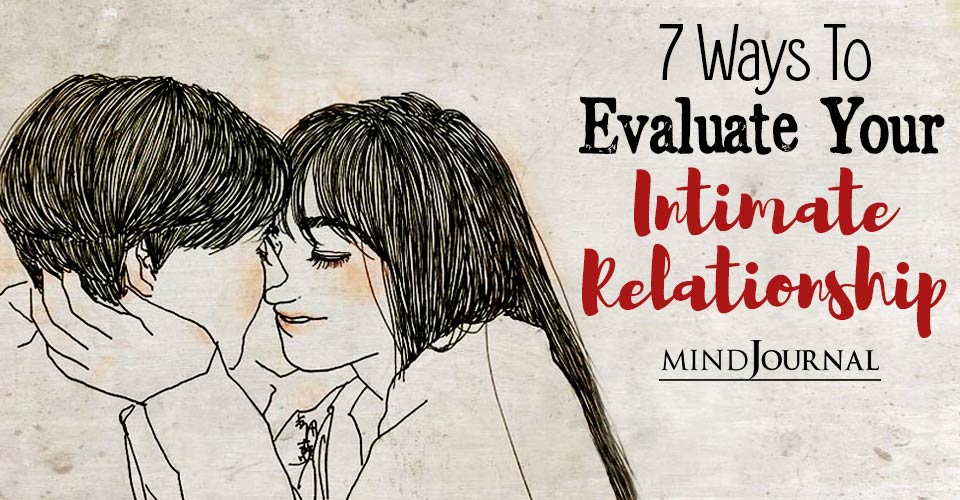Do you want to evaluate your relationship? Here’s an easy guide to see where your partnership is thriving or just surviving. Is it healthy or toxic? Find out with this happy relationship quiz.
Regardless of how long intimate partners have been together, they can always benefit from talking over how they currently feel about each other and their relationship.
Setting aside time to do a regular check-in can forestall potential problems and create proactive solutions.
There are many ways for a committed couple to evaluate how they’re doing, but there are seven dimensions of an intimate relationship that are both easy to recognize and to use as a starting point.
They are not meant to replace the areas that may be more unique to a particular relationship, but they can serve as a good beginning to your inquiry.
The seven dimensions are presented below. After reading the following descriptions of each of them, take the simple test after each one to see how you’re both doing in that area.
Have your partner do the same, and then compare your answers and see how your close your scores are to each other.
Whether your scores are the same or different, you can use that information to learn more about how each of you views your relationship, and what thoughts and feelings may be behind those evaluations.
You can compare your current scores with how they may have been when you first fell in love, and also use them to determine if you’d like to make changes in the future, and in which of the seven areas you would need to address.
How To Evaluate Your Relationship With Your Partner? Intimacy Quiz
Here Is The Happy Relationship Quiz
Answer the questions at the end of each dimension section according to this guide:
Never – 0
Rarely – 1
Sometimes – 2
Often – 3
Regularly – 4
A score of 15 to 20 means your relationship is thriving in that dimension.
A score of 10 to 15 means you should reevaluate your relationship and work on enhancing that part of your life together.
A score of fewer than 10 means you need to challenge where you are in that part of your relationship and how you can heal that rift.
Dimension Number One – Playing Together
There is no better way to evaluate a relationship than to ask the partners when they remember laughing hard together.
Humor and playfulness are part of every healthy relationship and are plentiful at the beginning of most. Whether playtime is spontaneous or planned, it is better if it is regenerating, light-hearted, and fun.
Playtime means that you are both doing something you mutually love to do at times when you both want to do it. It also requires that you are not carrying the past or future worries and that you set your burdensome responsibilities aside.
When partners play well together, they feel more light-hearted and closer. It is the way couples become magical children for each other in those moments where time doesn’t matter.
1) How often do you and your partner truly enjoy the same experience? ____
2) How often do you and your partner do something impulsive and fun? ____
3) Can you and your partner leave your burdens behind when you play together? ____
4) Are you able to get each other laughing hard? ____
5) Do you find yourselves amused in the same situations? ____
What is your total score? ____
Related: What Is Your Love Language? Take This 6 Question Quiz To Find Out
Dimension Number Two – Sharing Dreams
Throughout a relationship, you and your partner should be able to explore what you feel about things that you feel are not part of your everyday lives.
That can be as simple as talking about movies and books and imagining yourselves in those roles. Or, you can dream about what you might do if sudden good luck were to fall upon you.
More concrete ideas, such as where you might travel to or even where you will live when you’re older, are ways you can explore possible dreams together.
Investigating those possibilities can take you to more new imagined adventures, like talking about what you would like to change about yourself, or what you’d love to learn.
These special shared thoughts, even if they seem out of the realm of current possibilities, will expand your knowledge of each other’s inner worlds.
New couples often talk about dreams because their relationship is ahead of them. More established couples tend to forget to open each other up to new possibilities.
They do have the positive edge of memories and can use them to create new dreams for the future.
Whatever route is chosen, the partners in thriving relationships feel open to sharing whatever they might dream of without fear of invalidation.
1) How often can you and your partner share abstract thoughts and fantasies? ____
2) Do you feel that your partner is interested in your dreams? ____
3) Can you welcome each other’s philosophical and emotional thoughts? ____
4) Do you allow each other to explore possible dreams without shutting them down? ____
5) Do you feel free to share whatever is on your wishlist? ____
What is your total score? ____

Dimension Number Three – Trust
Hopefully, you and your partner are comfortable trusting each other with your innermost thoughts and feelings and can talk about almost anything without fear of rejection, embarrassment, or disdain.
You come to each other first when something is awry, and believe in your partner’s ability to listen and help.
Even when things seem okay, you still keep a running emotional and intellectual interaction going so that you are rarely surprised by something you don’t expect.
When new thoughts or feelings emerge, both of you are willing to put in whatever time it takes to get current and to try to understand and transform along with the other.
Trust is at the core of a healthy intimate relationship. You know that your partner is transparent, reliable, and accountable to what he or she promises.
You also can count on the fact that your partner will tell you up front if anything changes in the way he or she feels about you.
This dimension is where listening skills are the most important. Your goal is to refrain from being defensive, reactive, or threatened when your partner is distressed about the relationship, and you encourage them to open up.
When your first responses are compassion and encouragement, you will learn more about the deeper issues that may be under what is being said.
1) Do you talk to your partner about important thoughts and feelings without fear of distress? ____
2) When you are concerned about something important, do you feel your partner will listen deeply to your feelings? ____
3) Can you count on your partner to be there when you need him or her? ____
4) Do you consider your partner to be your closest friend? ____
5) Do you trust your partner to hold your inner thoughts and feelings sacred? ____
What is your total score? ____
Related: 26 Things You Need To Make Your Relationship Last
Dimension Number Four – Working as a Team
All intimate partners must work together to solve life’s challenges and problems if they want to stay closely connected.
Each knows that they both will do their parts as team members for whatever is being asked. They also willingly take over if the other has a legitimate need to temporarily pull out, trusting that the partnership obligations will even out over time.
Some couples decide what their individual roles as team members will be in advance, while others prefer to exchange many of their roles as they see fit at the time, or do more of them together.
In any case, you both feel confident that you can work out disagreements while keeping your mutual goals in mind.
You rely on each other without concern that either will not do what he or she has committed to do.
1) When there is a job to be done, can you count on your partner to do his or her part? ____
2) Do you believe your partner comes through with his or her promises? ____
3) Can you trust your partner to let you know if he or she cannot complete their promised commitment? ____
4) Do you feel comfortable with the distribution of responsibility and effort when you work together? ____
5) Can you talk things over when you disagree and come to better solutions? ____
What is your total score? ____
Dimension Number Five – Successful Debaters
Arguments in intimate relationships create cumulative stress for both partners. They are usually only resolved when one partner gives in to another, creating resentment and defeat.
Partners who want to turn their conflicts into optimum solutions want to find answers that will make both of them as happy as possible.
When the two of you don’t see eye-to-eye in the same situation, you will still listen deeply to each other’s point of view. You know that it is important to keep your partner’s needs as close to your heart as your own.
Couples who can disagree with compassion, respect, and support for the other are much more likely to find solutions that take them closer to a new truth.
They do not argue. Instead, they learn the art of debate, knowing that they must be able to feel and think as their partners do when called upon.
If you discover yourselves in an argument where you are becoming adversaries, you both agree to quiet down, give it some time, and come back in a more compromising frame of mind.
1) Do you feel you and your partner settle disagreements fairly? ____
2) When you are in conflict, do you listen openly to your partner’s point of view? ____
3) Do you feel your partner can listen and respect your desires when they are in conflict with his or hers? ____
4) Do your solutions consider both of your desires? ____
5) If asked, could you represent your partner’s position accurately? ___
What is your total score? ____

Dimension Number Six – Parenting the Child in your Partner
We are not only the age we are now but all the ages we’ve ever been. Memories are simply ways of going back in time and feeling as we did then.
As a result, there are times when you will symbolically be seen as a parent by your intimate partner. This dimension of a relationship can be the most difficult for many couples to navigate.
Your current relationship interactions may spark conscious or unconscious reactions from experiences you’ve had in childhood.
It is virtually impossible not to have those early memories affect the way we respond to the words, phrases, facial expressions, voice intonations, and touch from the partner we share our lives within the present.
Would you want to raise a child similar to your current intimate partner? Given what you know about him or her now, would you have treated that child differently? What would you value or resent in his or her personality?
How would you make that child feel beloved but also behave in ways that you felt were beneficial and successful to both of you?
1) Do you feel that your partner’s qualities would be likable to you if he or she were your own child? ____
2) Would you feel compassion for his or her struggles? ____
3) Would you want to change his or her behaviors or personality?____
4) Would he or she feel glad to have you as a parent?____
5) Would you feel competent to do a good job raising him or her? ____
What is your total score? ____
Related: 6 Communication Strategies Of Happy Couples in Relationships
Dimension Number Seven – Would the child in you want your partner as a parent?
This question is the complement to the one above, seen from the other side of the equation. Your partner will often symbolically parent you as he or she was parented as a child.
Looking at your partner’s parenting, you can see how that style of raising a child evolved and how it affected your partner’s behavior with you.
Responses to parental behaviors can run the gamut from satisfyingly pleasurable to deeply offensive. Those responses tend to increase with time.

What may have begun as tolerant and supportive responses can morph into more critical statements like, “You’re starting to drink too much, just like your father,” or “Your mother is incredibly cheap. Don’t pull that on me.”
If you are beginning to feel “parented” in a way that exudes resentment, hurt, or detachment, you must tell your partner how you’re feeling and why.
On the other hand, you may love the way your partner cradles you when you’re hurting or soothes you when you’re down.
It is crucial that “parental” behaviors do not re-wound you the way they did when you were small. If partners can identify them, they can replace their responses with those that help childhood sorrows heal.
1) When you need a symbolic parental caring, does your partner provide that for you in a helpful way? ____
2) When you feel childlike, vulnerable, and needing of comfort, do you feel your partner can give that to you? ____
3) Can your partner put aside his or her needs and be there for you when you ask? ____
4) Can your partner differentiate between symbolically parenting you in a good way as opposed to making you feel worse? ____
5) Would you have wished your partner had been your parent? ____
What is your total score? ____
Your answers to these questions may change markedly over time and with each stage of your relationship, but if you check them out on a regular basis, you can see where you’ve been, where you might be going as a partnership, and any changes you may wish to make.
Related: 14 Fun Quizzes For Couples And BFFs To Take Together
Whenever you have trouble dealing with your relationship issues, come back to this happy relationship quiz with your partner. If your scores match or almost match, then celebrate, and if they don’t, then make it a point to work on your relationship issues as a team, and you will be able to resolve everything in the blink of an eye! Try it out, if you haven’t yet.
Written By Randi Gunther Ph.D Originally appeared on: Psychology Today Printed with Permission












Leave a Reply